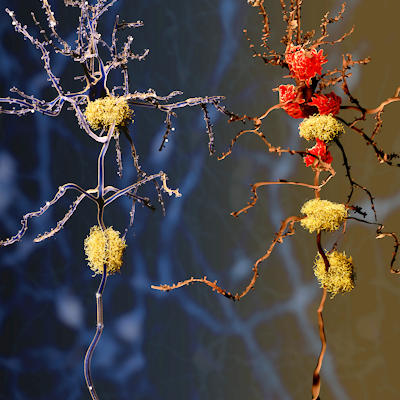February 22, 2023 -- DNA methylation affects gene and protein co-expression networks associated with Alzheimer’s disease and offers a novel way to treat the condition, according to new research.
The addition of methyl groups to DNA molecules, a process known as DNA methylation, can change the activity of a segment of genetic material without changing the code itself. DNA methylation is a common epigenetic modification that typically turns genes off, and its effect on gene expression is implicated in a range of conditions including some cancers.
Multiple papers have already described DNA methylation differences associated with Alzheimer's and other forms of dementia in several regions of the brain. The earlier work supports the hypothesis that epigenomic dysregulation is a key factor in the emergence and progression of Alzheimer's.
Building on that body of work, Mount Sinai researchers quantified the impact of DNA methylation on gene and protein expression and reported their findings in Alzheimer's & Dementia: The Journal of the Alzheimer's Association.
Bin Zhang, senior author and director of the Mount Sinai Center for Transformative Disease Modeling, explained how the work expands on existing evidence.
"Our study represents the first comprehensive effort to integrate high-throughput profiling of multi-omics in Alzheimer's disease. It provides a framework for future data integration at the multi-scale network level and could lead to the discovery of new targets for drug discovery in Alzheimer's disease," Zhang said in a statement.
Zhang and his collaborators analyzed postmortem brains from the Mount Sinai Brain Bank. The analysis included the brains of patients with mild cognitive impairment and Alzheimer's, as well as control brains without the neurological disease. The range of samples enabled the researchers to show how the brains of people with Alzheimer's differ from those of healthy controls.
The study focused on the parahippocampal gyrus, a part of the brain that is involved in the encoding and retrieval of memories, and profiled genome-wide methylomic variations. Further investigations linked the methylomic variations to changes on mRNA and protein co-expression networks. The work revealed 270 distinct differentially methylated regions in the Alzheimer's brains compared to the controls. Zhang and his collaborators validated the findings in brain samples collected through an independent project.
Additional studies are planned. The next step is to use the methods to study methylomic variation and its impact on multiscale networks at the single-cell level. That work could create a more detailed picture of the epigenetics of Alzheimer's by revealing the DNA methylation profiles of individual cell types.
Copyright © 2023 scienceboard.net








